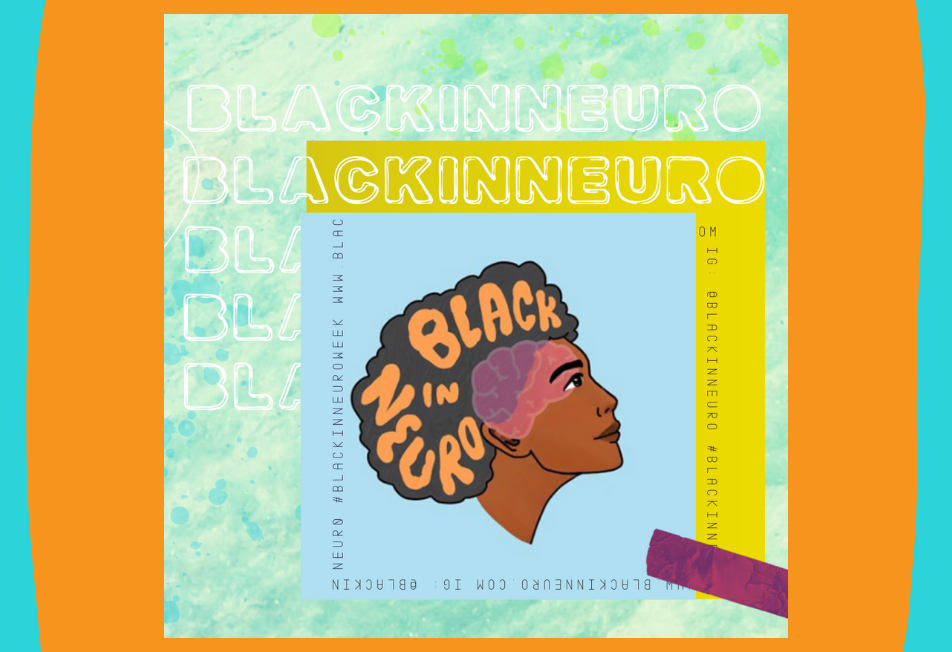Black in Neuro Week is coming to a timeline near you
Stay tuned for an exciting week.

[PRESS RELEASE - VIEW THE ORIGINAL HERE]
A team of neuroscientists, neuro-engineers, and science communicators has formed to create #BlackInNeuroWeek, a social media initiative aimed at celebrating, amplifying, and supporting Black voices in STEM (science, technology, engineering, and math).
The seven-day event, which will run from June 27 – August 2, 2020, will be primarily promoted on Twitter and Instagram from the @BlackInNeuro accounts. Resources, recorded talks and a database of Black In Neuro scientists will be archived at BlackInNeuro.com.
The 22 organizers represent a diverse range of neuro-related fields, from engineering, to clinical, to cellular and molecular neuroscience. Their experience spans from the undergraduate to the postdoctoral-level, and this international collaboration includes organizers from the United States, the United Kingdom, and Canada.
Lead organizer Angeline Dukes, a graduate student researcher at the University of California Irvine in the Department of Neurobiology and Behavior, says she was inspired to create the event based on other science-related initiatives circulating on social media in recent weeks.
“The idea for #BlackInNeuroWeek came from all of the other wonderful weeks being organized by Black people in various fields. It was inspiring seeing so many Black people engrossed in nature during #BlackBirdersWeek, learning about our contributions in astronomy during #BlackInAstro week, and witnessing our love for plants during #BlackBotanistsWeek,” Dukes says.
“When I began my Ph.D., it was only myself and one other Black woman — who is also on the organizing committee for #BlackInNeuroWeek — as the only Black representation in our program and in our department. There were no older Black graduate students or faculty we could get advice from or share our experiences. I’m so grateful that we had each other, but other Black students beginning their programs aren’t so lucky.”
The theme of community will be a central part of #BlackInNeuroWeek, Dukes says.
“This initiative is important because I know the necessity of community – having the support and guidance of people who look like you and have been through similar struggles.”
Lietsel Richardson, a mechanical engineering Ph.D. student at the University of Central Florida, and a fellow #BlackInNeuroWeek organizer, agrees.
“I wanted to get involved in Black In Neuro because I know first-hand how special it is for Black and Brown girls to see someone who looks like them,” she says.
“It’s so difficult to really place in words what an impact my previous minority mentors have had on my path to academia. If I didn’t see other Black scientists, educators, and professionals when I did, I’m not sure I would be where I am today. Because STEM fields have largely been more accessible to those with privilege, it’s so difficult to believe that you have what it takes to be in that space. I hope Black In Neuro Week inspires a whole new generation of Black neuro folks, and I also hope it reinvigorates those already in the field to keep pushing.”
#BlackInNeuroWeek will feature daily themed discussions. Anyone interested in participating is invited to submit social media posts on Twitter and Instagram using the designated hashtags outlined in the schedule below:
Details of daily events can be found by following the @BlackInNeuro accounts and at BlackInNeuro.com. The organizers hope the week-long event will add momentum to an ongoing conversation about representation in neuro-related fields while allowing current academics and professionals to connect.
“I also hope that non-Black people will also take this opportunity to connect with these phenomenal Black scientists and medical professionals, invite them for speaking engagements (preferably not just to talk about ‘diversity and inclusion’), nominate them for much-deserved awards, and recognize how their research impacts the Black community,” Dukes says.
“I hope that some Black K-12 students and undergraduates see us doing science and are inspired by it. I hope they realize that if they want to, they can do it too and we will be here cheering them on every step of the way.”
###
Media contact:
Name: Brielle Ferguson
Email address: BlackInNeuro@gmail.com
